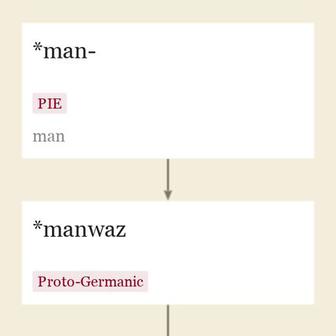man-like adj.
also manlike, mid-15c., "
Entries linking to man-like

"
Sometimes connected to root *men- (1) "
Specific sense of "
Man also was in Old English as an indefinite pronoun, "
As "
Man-about-town "
So I am as he that seythe, 'Come hyddr John, my man.' [1473]
MANTRAP, a woman's commodity. [Grose, "Dictionary of the Vulgar Tongue," London, 1785]
At the kinges court, my brother, Ech man for himself. [Chaucer, "Knight's Tale," c. 1386]
"
This is a compound of *ga- "
Formerly with comparative liker and superlative likest (still in use 17c.). The preposition (c. 1200) and the adverb (c. 1300) both are from the adjective. As a conjunction, first attested early 16c., short for like as, like unto. Colloquial like to "
Meaning "
updated on November 12, 2018